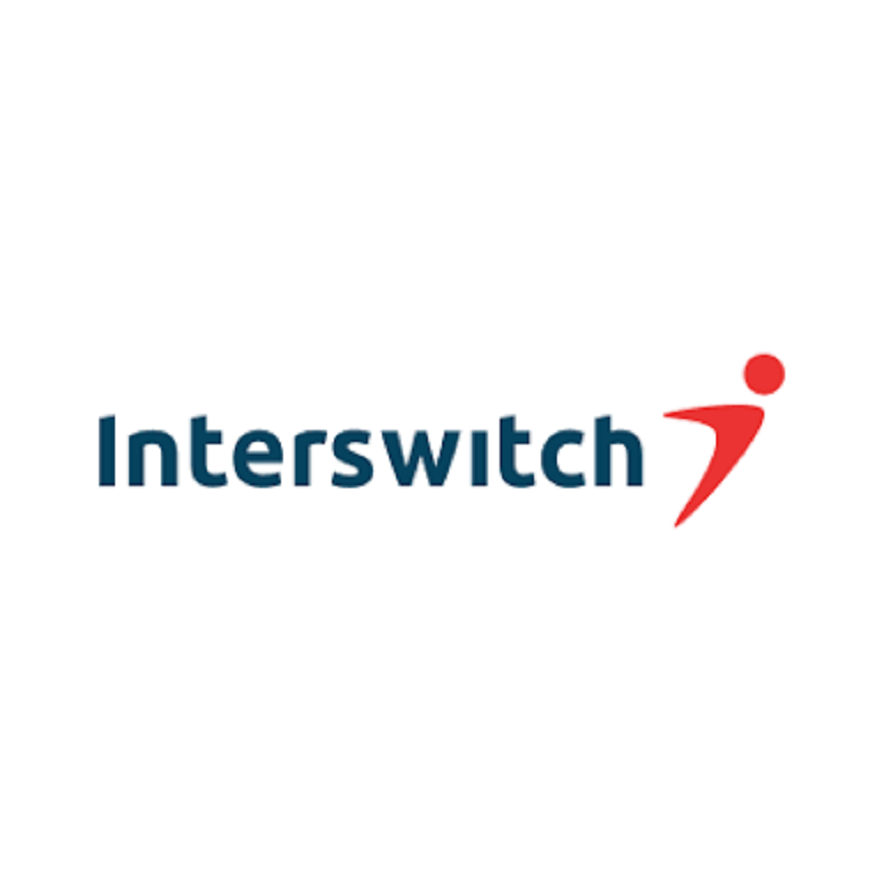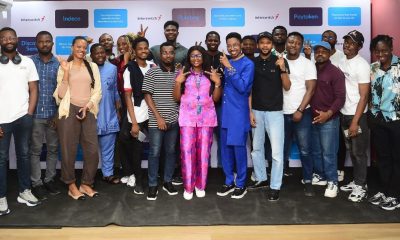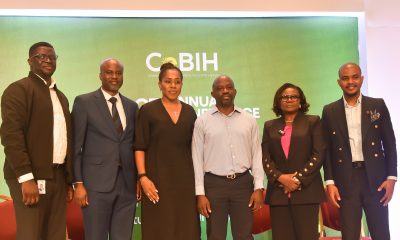Technology
Interswitch Tasks Women to Challenge Norm in Tech

By Adedapo Adesanya
Leading Nigerian digital payment and commerce solutions company, Interswitch Group continued to show its support for women in tech as it commemorated this year’s International Girls in ICT Day by encouraging young girls to challenge the norm and tap into the many potentials of the sector.
In a chat through Instagram Live to celebrate this year’s event themed Girls in ICT: Inspiring the Next Generation, Interswitch reached out to hopefuls by inspiring them through two women making strides in tech who shared their stories.
Miss Eddidiong Asikpo and Ifeanyichukwu Onwurah, pioneers in changing the norm shared stories of their career trajectories from young girls in science to now full-blown women in ICT during the chat, regalling viewers on how they are changing the narrative in a field that is regarded as male-dominated.
Using their stories filled with good and bad, they encouraged girls in Science, Technology, Engineering, and Mathematics (STEM), painting the many profitable and fulfilling future that the sector had to offer.
Miss Edidiong Asikpo, Software Engineer at Interswitch, and anchor of the live session began the session by reiterating that the ICT Day was created to encourage girls to consider careers in ICT.
She shared her experience on how transitioning from Medicine to Tech.
“I never wanted to become anything technical. I applied to study Medicine and Surgery in the university. When that did not work out, I started at Innovation Hub at Akwa Ibom to learn Application Development. Tech started to become cool because I thought I would start doing what the big boys at Facebook do.
“Indeed, tech has afforded me access to greater opportunities and contributes to making life better,” she said.
She further added that for the next generation to be brought into tech universe, they would need to be intentional about it, by searching for opportunities and being open to mentorship.
This is one of the many roles Interswitch currently plays, and is willing to continue to play, in raising the next generation of tech girls and women who’ll make disruptive impact in the tech space.
On her part, Miss Ifeanyichukwu Onwurah, Senior IT Service Management Analyst atInterswitch, talked about her journey into tech as a rough one and described it as “Failing forward”.
“At some point in the university, I lost enthusiasm. I failed a lot, struggled through school and didn’t quite understand my purpose. All I wanted to do was look pretty in a pretty job”, she said.
This soon started to change – “After training school, I was deployed to the Tech Department where I struggled in my mind again, for nine months. However, Tech has turned out to be the best decision that I ever made.
“I was inspired by my Group Head, who answered all my questions and helped me through a mind switch. So, I made up my mind not to be defined by my school grades and this drove me to be better at my work. Seven years later, I’m no longer where I used to be and it has been an exciting journey so far.”
Both ladies concluded by encouraging young girls to pursue their tech dreams with grit and deliberateness. They also admonished parents to support their girls by providing useful learning resources especially in their formative years.
Interswitch through this initiative and many more is challenging gender bias and pushing for gender inclusion in the tech space. To bring in more women into the tech space, the service through InterswitchSPAK and STEMLIKEAGIRL Initiatives is pioneering the change.
The InterswitchSPAK Annual Science Competition is one of the ways through which Interswitch creates an equal opportunity environment for more girls to chart a career path in ICT. Since the start of the competition in 2018, there has been an impressive Increase In the participation of girls.
International Girls in ICT Day is an International Telecommunication Union (ITU) initiative and global movement, to encourage girls and young women to consider studies and careers in ICT. It is annually celebrated on the Fourth Thursday of April.
Technology
Leticia Otomewo Becomes Secure Electronic Technology’s Acting Secretary

By Aduragbemi Omiyale
One of the players in the Nigerian gaming industry, Secure Electronic Technology (SET) Plc, has appointed Ms Leticia Otomewo as its acting secretary.
This followed the expiration of the company’s service contract with the former occupier of the seat, Ms Irene Attoe, on January 31, 2026.
A statement to the Nigerian Exchange (NGX) Limited on Thursday said Ms Otomewo would remain the organisation’s scribe in an acting capacity, pending the ratification and appointment of a substantive company secretary at the next board meeting.
She was described in the notice signed by the Managing Director of the firm, Mr Oyeyemi Olusoji, as “a results-driven executive with 22 years of experience in driving business growth, leading high-performing teams, and delivering innovative solutions.”
The acting secretary is also said to be “a collaborative leader with a passion for mentoring and developing talent.”
“The company assures the investing public that all Company Secretariat responsibilities and regulatory obligations will continue to be discharged in full compliance with the Companies and Allied Matters Act, applicable regulations, and the Nigerian Exchange Limited Listing Rules,” the disclosure assured.
Meanwhile, the board thanked Ms Attoe “for professionalism and contributions to the Company during the period of her engagement and wishes her well in her future endeavours.”
Technology
Russia Blocks WhatsApp Messaging Service

By Adedapo Adesanya
The Russian government on Thursday confirmed it has blocked the WhatsApp messaging service, as it moves to further control information flow in the country.
It urged Russians to use a new state-backed platform called Max instead of the Meta-owned service.
WhatsApp issued a statement earlier saying Russia had attempted to “fully block” its messaging service in the country to force people toward Max, which it described as a “surveillance app.”
“Today the Russian government attempted to fully block WhatsApp in an effort to drive people to a state-owned surveillance app,” WhatsApp posted on social media platform X.
“Trying to isolate over 100 million users from private and secure communication is a backwards step and can only lead to less safety for people in Russia,” it said, adding: “We continue to do everything we can to keep users connected.”
Russia’s latest move against social media platforms and messaging services like WhatsApp, Signal and Telegram comes amid a wider attempt to drive users toward domestic and more easily controlled and monitored services, such as Max.
Russia’s telecoms watchdog, Roskomnadzor, has accused messaging apps Telegram and WhatsApp of failing to comply with Russian legislation requiring companies to store Russian users’ data inside the country, and of failing to introduce measures to stop their platforms from being used for allegedly criminal or terrorist purposes.
It has used this as a basis for slowing down or blocking their operations, with restrictions coming into force since last year.
For Telegram, it may be next, but so far the Russian government has been admittedly slowing down its operations “due to the fact that the company isn’t complying with the requirements of Russian legislation.”
The chat service, founded by Russian developers but headquartered in Dubai, has been a principal target for Roskomnadzor’s scrutiny and increasing restrictions, with users reporting sluggish performance on the app since January.
Technology
Nigerian AI Startup Decide Ranks Fourth Globally for Spreadsheet Accuracy

By Adedapo Adesanya
Nigerian startup, Decide, has emerged as the fourth most accurate Artificial Intelligence (AI) agent for spreadsheet tasks globally, according to results from SpreadsheetBench, a widely referenced benchmark for evaluating AI performance on real-world spreadsheet problems.
According to the founder, Mr Abiodun Adetona, the ranking places Decide alongside well-funded global AI startups, including Microsoft, OpenAI, and Anthropic.
Mr Adetona, an ex-Flutterwave developer, also revealed that Decide now has over 3,000 users, including some who are paying customers, a signal to the ability of the startup to scale in the near future.
SpreadsheetBench is a comprehensive evaluation framework designed to push Large Language Models (LLMs) to their limits in understanding and manipulating spreadsheet data. While many benchmarks focus on simple table QA, SpreadsheetBench treats a spreadsheet as a complex ecosystem involving spatial layouts, formulas, and multi-step reasoning. So far, only three agents rank higher than Decide, namely Nobie Agent, Shortcut.ai, and Qingqiu Agent.
Mr Adetona said SpreadsheetBench measures how well AI agents can handle practical spreadsheet tasks such as writing formulas, cleaning messy data, working across multiple sheets, and reasoning through complex Excel workflows. Decide recorded an 82.5% accuracy score, solving 330 out of 400 verified tasks.
“The result reflects sustained investment in applied research, product iteration, and learning from real-world spreadsheet workloads across a wide range of use cases,” Mr Adetona told Business Post.
For Mr Adetona, who built Decide out of frustration with how much time professionals spend manually cleaning data, debugging formulas, and moving between sheets, “This milestone highlights how focused engineering and domain-specific AI development can deliver frontier-level performance outside of large research organisations. By concentrating on practical business data problems and building systems grounded in real user environments, we believe smaller teams can contribute meaningfully to advancing applied AI.”
“For Decide, this is a foundation for continued progress in intelligent spreadsheet and analytics automation,” he added.
-

 Feature/OPED6 years ago
Feature/OPED6 years agoDavos was Different this year
-
Travel/Tourism10 years ago
Lagos Seals Western Lodge Hotel In Ikorodu
-

 Showbiz3 years ago
Showbiz3 years agoEstranged Lover Releases Videos of Empress Njamah Bathing
-

 Banking8 years ago
Banking8 years agoSort Codes of GTBank Branches in Nigeria
-

 Economy3 years ago
Economy3 years agoSubsidy Removal: CNG at N130 Per Litre Cheaper Than Petrol—IPMAN
-

 Banking3 years ago
Banking3 years agoSort Codes of UBA Branches in Nigeria
-

 Banking3 years ago
Banking3 years agoFirst Bank Announces Planned Downtime
-

 Sports3 years ago
Sports3 years agoHighest Paid Nigerian Footballer – How Much Do Nigerian Footballers Earn



















